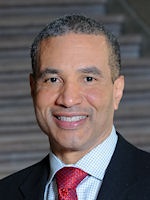
Lake Merced Transport (LMT) System captures and controls sewage and stormwater runoff from the extreme Southwestern portion of the City. Oceanside Wastewater Treatment Plant crew walk the LMT.
As a member of the City and County of San Francisco’s leadership team, a father of two young sons, a black man and a human being, I am outraged and horrified at the environment in which we find ourselves today.

Harlan Kelly,
General Manager, SFPUC
It is a difficult conversation that I am having, yet again, with my children. They are asking me why a police officer would hurt a man in the way that they did. Our family has long-standing relationships with police officers and even police chiefs.
What do you say to your children? “Some people may not like you simply because of the color of your skin.”
It’s appalling that I have to have that conversation with my sons in 2020. I’m tired of having to explain to them how they may be seen by others just because of the way they look.
For too long, the African American community has suffered from racial injustice. I understand the nationwide protests are a reflection of the grief, anger and frustration that many of us are feeling as we reflect on long-standing injustices felt by the African American community, and by people of color.
I have spent my entire career working to make a difference. As part of my professional journey, I have experienced first-hand what it is like to be one of the few African Americans in the room, like when I was enrolled in UC Berkeley’s Civil Engineering program in the 1980s or when I later joined the City as a junior engineer. As a result of those experiences, I have tried to create opportunities to have more African Americans, Latinos, Asian Americans and other people of color exposed to careers in our industry. That is why I worked so hard to create ‘Project Pull’ 25 years ago, providing real skill-building opportunities to hundreds of young men and women in San Francisco each year who don’t always get those chances.
I am proud of the SFPUC’s firm commitment to ensuring Diversity, Equity and Inclusion in our workplace. As an organization, the SFPUC took an important step forward recently with the adoption of a Commission resolution that condemns systemic racism and takes action to promote racial justice.
You can read the full resolution online, but for discussion purposes I’ll break it down into two parts:
With this strong policy statement, the SFPUC is being intentional about our commitment to advancing racial justice by centering the agency’s programs and resource allocations on racial and social equity while carrying out its mission, both as a regional employer as well as a service provider.
This effort aligns with the larger Citywide effort to address racial equity and justice issues, including the newly created Office of Racial Equity (ORE). As part of ORE’s legislative mandate, each City Department is required to complete a Racial Equity Action Plan. The Racial Equity Action Plan is required to include Racial Equity indicators to measure current conditions and impact, outcomes resulting from changes made within programs or policy, and performance measures to evaluate effectiveness, that demonstrate how a City Department will address Racial Disparities within the department as well as in external programs.
Each City Department will designate employees as Racial Equity Leaders, acting as a liaison to ORE. SFPUC’s Racial Equity Leads will work with a Racial Equity Team comprised of Division Racial Equity Leads representing the Water, Wastewater and Power Enterprises, Business Services and External Affairs Bureaus, Human Resource Services, and Infrastructure Division.
What’s most exciting about this work is that it compels our employees, our agency, and the SFPUC Commission (our oversight body) to make real change.
Following the murder of George Floyd, however, I find myself wanting us to do more. It takes me back to 1995, when I walked in the Million Man March in Washington DC. I felt compelled at that time to use my voice to join with others who wanted to shed light on the injustices facing the African American community. Twenty-five years later, I feel similarly compelled.
How we come together as individuals and as an organization is as important as ever. There is so much more that needs to be done in order to address the systemic racism that permeates all aspects of our society. And I am committed to figuring out what more we can do together at the SFPUC to do our part.
So, where do we go from here? We don’t need to have all of the answers right now. But there are steps we can take to make a difference within our own organization. I am creating a space in which we can all have this conversation together. I’m sharing my story, and I want to hear yours.
I encourage you all to consider what you can do, big or small, to make a difference. Together, we can be the change that we want to see in the world, in our own communities and in our workplace.
I recently shared my personal and professional story and was uplifted by the many responses I received from employees, colleagues and partners who want to be a part of the racial justice conversation at the SFPUC.
The truth is, this topic is deeply personal, and it will likely be difficult and uncomfortable at times to discuss. That shouldn’t stop us from having discussion, but we must do so with honesty and sensitivity.
We all have a role to play. It’s incumbent upon each of us to reflect and contribute to collective organizational change, within this agency and our City.
Together, this team will undertake a meaningful engagement process that will include a diverse and inclusive group of staff members with various backgrounds and positions at various levels within the agency.
The Racial Equity Action Plan provides a blueprint for advancing racial equity in all aspects of the Department’s work over the next three years. Its framework allows us to capture all of the work called for under our Commission’s Racial Justice Resolution. The Racial Equity Team will develop SFPUC’s Racial Equity Action Plan according to the timelines provided by ORE and will report quarterly to our Commission. Per ORE, City Departments are required to integrate the Racial Equity Action Plan into departmental five-year strategic plans. Beginning in 2022, each department will be required to prepare an annual report on the Department’s progress toward goals set forth in its Racial Equity Action Plan.